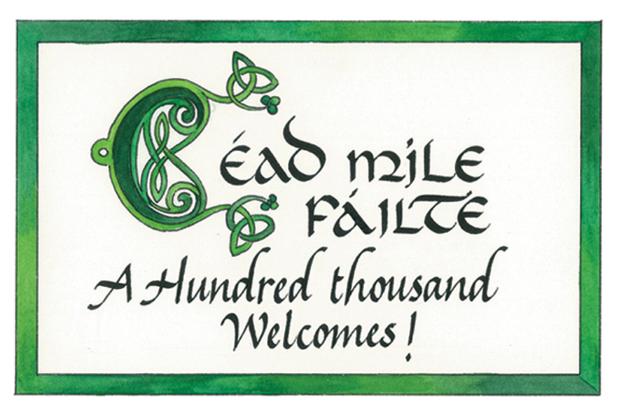 Irish people are proud of their traditional image of being an hospitable, welcoming nation. Céad Míle Fáilte, a hundred thousand welcomes, is a familiar greeting for our foreign visitors! I imagine that this reputation, handed down from generation to generation, was greatly influenced by the Christian tradition, where hospitality is seen as a core virtue, both in Old and New Testaments.
Irish people are proud of their traditional image of being an hospitable, welcoming nation. Céad Míle Fáilte, a hundred thousand welcomes, is a familiar greeting for our foreign visitors! I imagine that this reputation, handed down from generation to generation, was greatly influenced by the Christian tradition, where hospitality is seen as a core virtue, both in Old and New Testaments.
Many of you may share memories of parents who took hospitality seriously. Remember all the cleaning that went on in the days before those ultra-tidy aunties visited? Then on the big day, the excitement of eating in the dining room rather than the kitchen, not to mention the cakes and sweet things baked by your mother? And then, there were the surprise guests who came unannounced, always, it seemed, around mealtimes; and there was a rush to find something to put on the table! I wonder if my mother really understood that her welcome was an imitation of Christ, an expression of Christian love?
The readings from Scripture for the feast of the Body and Blood of Christ all have to do with this virtue of hospitality, two of them explicitly, two implicitly.
In the reading from Genesis, we hear about a king who is also a priest, Melchizedek. He is included because of his offering of bread and wine to Abraham and then blessing him. Right from the beginning of the Bible then, we are told that the role of the priest is to bless and nourish. This early priest prefigures the priesthood of the Messiah underlined in the psalm. Later in the New Testament, in the Letter to the Hebrews, Jesus will be understood as the great High Priest, the one who is our priest forever, blessing us with this sacramental food, until He comes again in glory.
The Gospel account of the feeding of the multitude is introduced with a mention of Jesus making the crowd welcome. Everything else follows from this and is an expression of the hospitality of God. First, and above all, Jesus speaks about the Kingdom of God, then He heals and only then does He go further still in insisting on feeding the multitude. Note the contrasting attitude of His disciples who want to send the people away. No doubt they feel that the Lord has done enough for these demanding folk. The context highlights the generosity involved, since Jesus has been intending to take His disciples aside to rest and recuperate after their return from a mission. And, instead, Jesus welcomes the crowd! This is supreme, even extreme, hospitality.
Then there is the reading from St Paul, in which he talks about the Last Supper during which Jesus gives thanks for the bread before offering it to his disciples. This is where the idea of Eucharist comes from – it means to give thanks. This is the priestly Jesus, the Good Shepherd who wants to feed his flock, his friends. And, as in the case of the demanding crowd, here we are reminded that all this happens on the night he was betrayed, the night his disciples abandon him, the night of his agony in the garden. He does not take refuge in self-pity, or anger, or frustration. No! He thinks first of his friends and of hospitality. Why, in John’s Gospel, he even washes their feet, to their great amazement!
The theme of welcome is also found in this reading, when Paul speaks of “receiving” this message from the Lord concerning the institution of the Eucharist. You see the word ‘receive’ is the same as the word ‘welcome.’ Important guests are ‘received by’ the President, Queen, or Pope. Special ‘receptions’ are held to display how the person being welcomed is esteemed and appreciated. We ‘receive’ gifts on special occasions, and the most important gifts of all are the people we love and respect.
On this great feast day, God is putting on this reception for us in the Mass. He is the host who receives us at the door, welcomes us in, and feeds us in the first part on his Word in the readings. This is the meaning of Paul’s reference to his ‘receiving’ the message. Like him, we must welcome the Word of God and give it a home in our hearts.
But this is just the starter, which whets our appetite for the main course, Holy Communion. Now, astoundingly, the tables are turned and the host who receives us is received by us. We receive the host in communion. The host, God, gives himself to us in return for the gift of ourselves. For who can come to visit empty handed? We must bring a gift and the greatest is ourselves. What an exchange! We bring our poor, sinful selves to God and He gives us Himself to nourish our bodies and souls.
Such is the dynamic of the Christian life. It is welcome followed by welcome. Typically, a person gives a gift to another. The other says, “Thank you.” And the final response is: “You are welcome.”
Christian life is a life of hospitality, but God’s first, as the door of His heart is always open. Then, hopefully, we in return open our hearts to Him and to others.
Amen. So be it.
